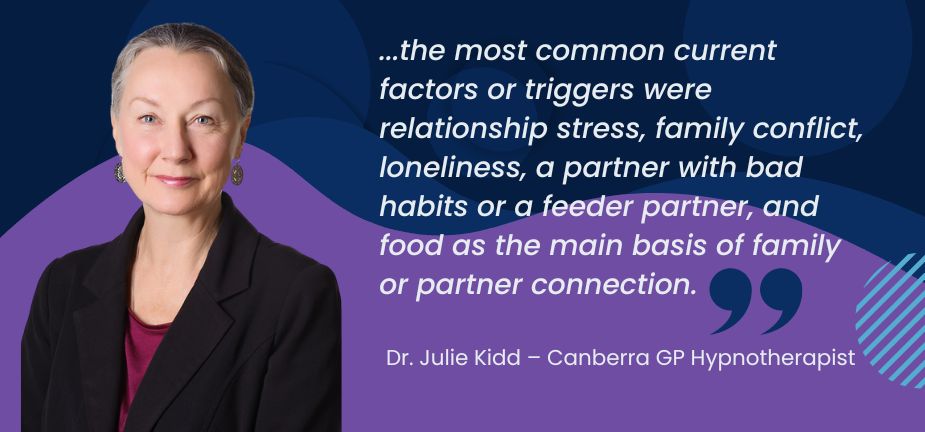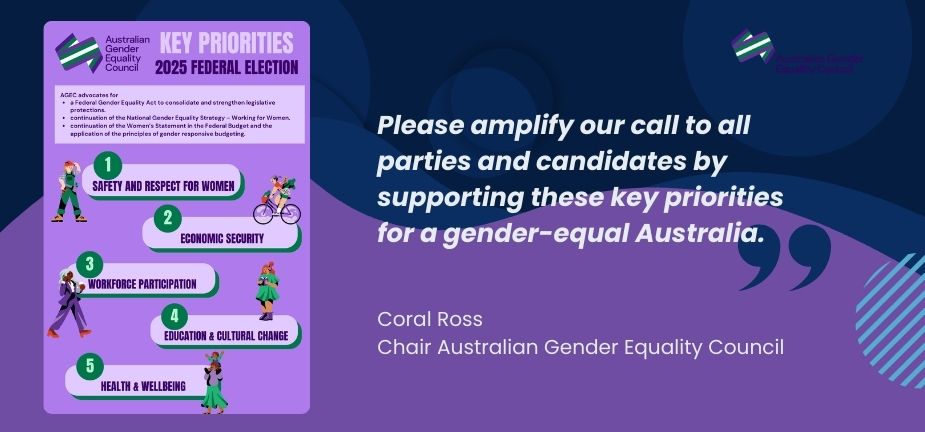The following was submitted by Canberra GP Hypnotherapist and AFMW member, Dr Julie Kidd. The article is a review of 100 patients with disordered eating to find the root causes of the behaviour.
Treating The Cause
Why do so many diets and eating programs fail long-term? With that question in mind, I combed through my files for data on the emotional/psychological drivers of unhealthy eating behaviour. I extracted all the data from my notes that I could on a random selection of 100 of the patients who came to me for medical hypnosis for weight loss and unhealthy eating habits. The list includes emotional eaters, binge eaters, junk food addicts, night eaters, boredom eaters, and those with simple bad habits – as well as the ‘yoyo dieters’ who cycle regularly from restriction to blowout.
I took an extensive history related to food and body image over their lifetime, then took them through a gentle process to uncover what actually drives them to overeat. As part of the process, the patients report the memories that came to them during the session.
For so many of my patients who are overweight or obese, there is a clear pattern of their unhealthy habits around food originating in trauma, their family of origin, in being bullied as a child, or in stressful adult relationships and health issues. This indicates to me that, while GLP-1 agonists may temporarily alter the physiology, deep work is still necessary to move and heal the emotional patterns that fuel their addictive or difficult habit patterns around food.
Through my patient survey, I found that:
- 21 of the 100 patients had childhood trauma, including 6 patients reporting sexual abuse, 7 physical abuse, 5 neglect, 16 emotional abuse, 6 isolation, and 8 reporting a parent who was alcoholic or mentally ill. Some reported multiple traumas.
- 47 reported a history of unhealthy food behaviour and attitudes to body appearance in their family of origin. Of these:
- 4 had a history of being food restricted as children, by parents (usually mothers)
- 11 had binge-eating parents or those who lived on junk as the norm
- 4 were force-fed (for being too thin or because of an authoritarian parenting style)
- 5 had a mother who was ‘always on a diet’
- 8 had a parent or grandparent who was ‘obsessed with appearance’
- 3 were given sweets specifically to assuage emotions
- 6 were home alone and ate to fill the loneliness
- 10 were from an overweight/obese family, as part of their identity
- 3 reported their mother over-giving food as a demonstration of love
- 4 were in a double bind with 1 adult encouraging eating and that adult (or another) also telling them they were fat
- 18 were told they were fat, with particular pejoratives that stuck in their minds, overlapping with 14 who reported that they were teased, or bullied in childhood and/or in their teens.
- 18 of my overeating patients started the bad habits after adult trauma or chronic stress. Of those:
- 15 had deaths, other major losses, DV, stalking, divorces, bullying, or sexual assaults.
- 16 had relationship problems, breakups, including family schisms.
- 5 started the bad habits after having children or with menopause.
- Several started the habits with changes in their physical condition: 3 with hypothyroidism, 2 with medications and 4 with injuries that caused immobility.
- 1 recommenced binge eating after positive comments on her appearance and one when she was sexually assaulted after losing weight.
Finally, the most common current factors or triggers were relationship stress, family conflict, loneliness, a partner with bad habits or a feeder partner, and food as the main basis of family or partner connection. The point for me of uncovering all this is to address the root causes and do my best to neutralise the effect of the emotional drivers. Once that is done to the degree that it can be, then the job of hypnotherapy is to increase the enjoyment of healthy food, delete the desire for unhealthy food, and move the patient confidently towards a happy, healthy, active future. There’s no calorie counting.
The advent of the GLP-1 agonists has revolutionised our treatment options for overweight and obese people. However, these medications only address the physiology temporarily and don’t address the mind that wants to eat to placate emotions, that wants a treat or a reward, that needs to binge to subdue anxious feelings or that needs to punish itself. For this, medical hypnosis can be an effective and safe technique in good hands.
As a GP, and as a medical hypnotherapist, I’ve been working with overweight and obese patients for decades. It’s clear to me that the way forward, for our patients who want medication and are suitable for it, is to include both elements in our treatment plans. GLP-1 agonists can be useful to kickstart a positive spiral, but for long-term outcomes in mental and physical health and a healthier weight long-term – it is essential to transform the emotional patterns that underlie a difficult relationship with food.
By
Dr. Julie Kidd – Canberra GP Hypnotherapist
drjkidd@canberrahypnosis.com.au
m: 0425 300 233
The Australian Federation of Medical Women (AFMW) is a not for profit, politically neutral, non sectarian, non government organisation that seeks to improve the health of all Australians, especially the health of women and children.
Events and Updates coordination by AFMW, on behalf of the Australian Federation of Medical Women (AFMW), its affiliated Australian state and territory partners and international networks and supporters. If you have an update or event you would like to share with us for Australian medical women, please contact us with details. Thank you.










